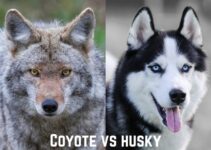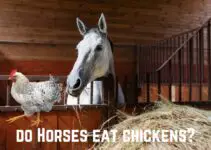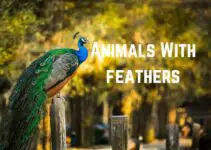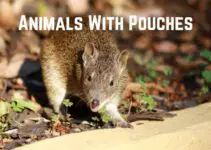Dogs are no doubt man’s best friend, and since the dawn of time, we have learned that these furry canine companions love chasing squirrels and like breeds. This could be traced to their instinctive nature for survival.
Many years ago, before man ever thought to domesticate these animals, dogs werewolf-like carnivores prowled their territories looking for small animals to kill and eat. So even though modern-day dogs are domesticated and friendly, they still carry a strong instinct to hunt occasionally.
This strength of this instinct and frequency to chase after a squirrel varies from breed to breed as some breeds are naturally aggressive while others are calmer. Some dogs chase squirrels mainly for fun or exercise, so if you see your furry canine chasing a squirrel, it does not mean your dog has developed a taste for squirrel meat.
So this has nothing to do with your feeding methods but more to do with their inborn nature. If your dog eats a squirrel, you have nothing to worry about, but if it eats an already dead squirrel, it may be a cause for alarm.
However, your first question should not be, “why did your little friend eat a squirrel?” But how long has the squirrel been dead? And was the squirrel sick before death?
Contents
What Should You Do if Your Dog Ate a Squirrel?
There is usually no cause for panic if your dog killed the squirrel himself before eating. But you still need to do some inspection on your dog as the squirrel could have bitten your dog. If your dog was bitten, clean the wound with hydrogen peroxide. Another case entirely is when your dog eats an already dead squirrel.
Dead squirrels can contain parasites or bacterial infections depending on how long it has been dead. If your dog has eaten a dead squirrel, take it to the vet for a checkup. There is also a chance that the squirrel was poisoned to death so ask your neighbors if they had used rodenticides recently.
The use of rodenticides is banned in some places, so you need to make your neighbors trust you enough to tell you if they were using rodenticides.
A medium or large dog that has eaten a poisoned squirrel may experience vomiting, diarrhea, or general weakness for a few days, after which they would go back to normal. But it’s best to take them to the vet just to be on the safe side.
Can Dogs Get Sick From Killing a Squirrel?
When a dog kills a squirrel, the only danger your dog might face is the possibility that the squirrel bit it. This on its own isn’t a bad thing, and a simple checkup at home and some wound cleaning should do the trick.
However, there is another unlikely case, and that could be that your dog ends up getting ticks. Dogs might get ticks from going out to the garden, so make sure your dog is always given preventive tick treatment.
This can be critical to your dog’s health because ticks carry Lyme disease, a serious condition. It has symptoms like fever, joint pain, lameness, etc. It is wise to bring your dog to the vet if you think it contracted Lyme disease. It is treated with antibiotics, and the treatment usually takes a month.
Squirrels carry leptospirosis in some areas in the United States. This species of bacteria affects the internal organs like the liver and kidney. This can be carried in the squirrel’s urine, and if your dog is exposed to the urine while killing the squirrel, it might contract it.
It is rare or unheard of that a dog might get rabies from contact with a squirrel with rabies because a squirrel with rabies dies quickly before getting the chance to spread the disease to another animal. Going to your vet and getting your dog checked is the best solution, in any case, to avoid your dog getting sick.
What Could Happen if Your Dog Eats a Dead Squirrel?
When your dog eats a squirrel that was already dead when it found it, there may be a danger to your dog’s well-being. If the squirrel has been rotting for days, it may be infected by parasites.
Also, there is a chance that your dog might get food poisoning, which may lead to diarrhea and vomiting. One worrying part of your dog eating an already dead squirrel is that the squirrel might have been poisoned.
If the squirrel has been poisoned, the poison may get into your dog’s system. The dose of poison ingested by your dog will probably not lead to their death but will harm your dog’s health for a while. So get some veterinary treatment quickly. If your dog eats an already dead squirrel, it might get infected by two common parasites: roundworm and coccidia.
If your dog has roundworms, the worm will consume the nutrients in your dog’s body, leaving your pet malnourished. This can make your dog dangerously sick if not treated promptly. Symptoms of roundworm include vomiting, coughing (the larvae have entered the lungs), loss of appetite, abdominal swelling, etc.
Symptoms of coccidia include lethargy, dehydration, diarrhea, blood and mucus (if it is severe), loss of appetite etc. Coccidia tends to affect young dogs more than grown ones. It is extremely rare for death to occur due to coccidia; it causes things like diarrhea, dehydration and others, which can be dangerous in themselves.
Some dogs that contract coccidia are symptomless and acts as carriers of the parasites. So the best way is to take your dog to the vet just in case it is infected with coccidia and is symptomless or at least seeks some professional advice.
How To Stop Your Dog From Eating a Dead Squirrel?
One way to get your dog to stop eating a dead squirrel is by using the “leave it” command. This command must be well known and obeyed by your dog, and the quicker or earlier you train your dog, the better. This can be fulfilled with the use of different methods.
Another popular method is to place a treat on the floor, and when your dog comes over to inquire, being curious as always, cover the treat using your foot. Keep your foot on the treat till your dog gives up on trying to get it. After your dog has given up, say a command word like yes, then give your dog an entirely different threat.
This should be repeated repeatedly until your dog understands when to leave something and the fact that it would be rewarded if it does so. After some time, put the treat on the floor, not covering it but saying a word like “leave it“.
If the training worked, your dog should leave the treat alone. After your dog has shown that it can obey commands, try it on walks to the park.
Are Squirrels Dangerous to Dogs?
Although a squirrel is smaller than a dog and less likely to try to chase your big dog, squirrels pose a potential threat to your dog’s health. Squirrels carry deadly parasites and ticks which can transmit diseases like Lyme disease; rocky mountain spotted fever, tularemia and others. That’s why veterinarians advise that it is essential to regularly treat your dog with a preventive tick treatment.
Dogs can even contract ticks from being in the same backyard with an animal (e.g. a squirrel). Squirrel droppings contain salmonella bacteria and leptospirosis; they are very small, often the size of a grain of rice.
Leptospirosis, also called “lepto”, can also be found in the urine of a squirrel. Leptospirosis tends to survive or thrive in a damp or moist environment, so make sure you keep your dog away from wet places like puddles or drainage ways.
Conclusion
Even though dogs can usually survive eating squirrels, they shouldn’t and should not be encouraged to do so. We have seen the risks related to dogs eating squirrels and how the danger increases if the squirrel is already dead.
Squirrels are animals who are wanderers and have the habit of going from place to place. They love to eat many things, and even if they are not poisoned, you won’t know what your dog may have ingested by eating a squirrel. So the best thing to do is to call the vet, professionals or emergency hotline.







